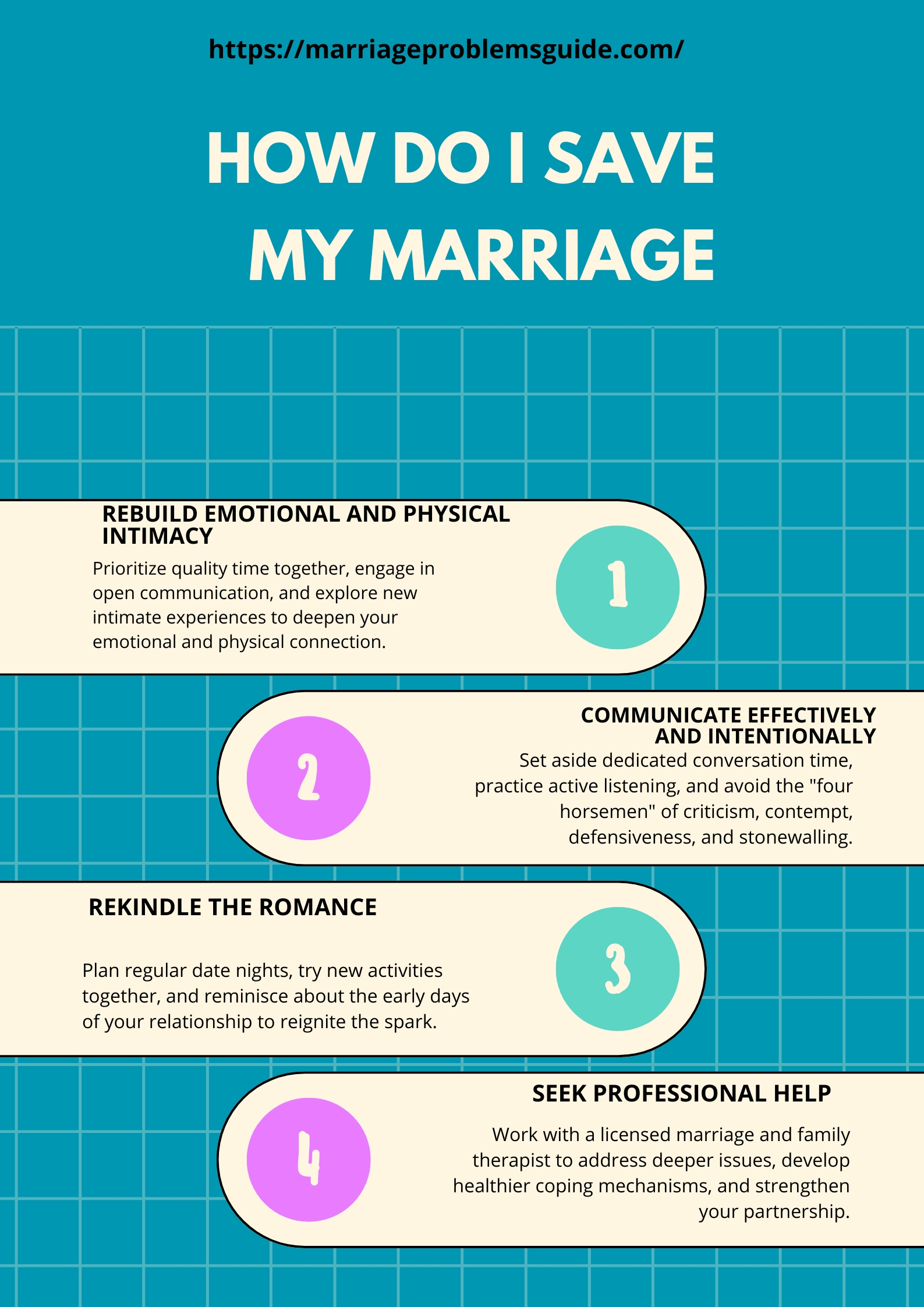Marriage is a beautiful, ever-evolving journey, but the path is not always smooth. Like a delicate rose, a marriage requires constant nourishment and care to bloom and thrive.
When the petals begin to wilt and the stems grow thorny, it’s time to tend to your relationship with intention and expertise.
In this blog post, we’ll uncover the 8 therapist-approved tips that can help you save your marriage from the brink of despair.
From rekindling the flames of intimacy to setting mutual goals for the future, these strategies will empower you and your partner to revive the love and connection that first brought you together.
Get ready to roll up your sleeves and do the work, because a beautiful, blossoming marriage awaits on the other side. Let’s dive in and discover how you can cultivate a partnership that stands the test of time.
Key Takeaways
- Rebuilding intimacy, both emotional and physical, is crucial for strengthening your marriage.
- Effective, intentional communication is the foundation for resolving conflicts and deepening your connection.
- Dedicating quality time to your partner, free from distractions, can help you rediscover the joy and wonder of your relationship.
- Practicing forgiveness and letting go of grudges is essential for moving forward and rebuilding trust.
- Avoiding controlling behaviors and fostering a balanced, respectful relationship can create a supportive environment for your marriage to thrive.
- Rekindling the romance and tapping into the passion that first brought you together can reignite the spark in your relationship.
- Setting mutual goals for the future and working towards them together can strengthen your sense of purpose and unity as a couple.
- Seeking professional help through marriage counseling or couples therapy can provide invaluable support and guidance when navigating complex relationship challenges.
- Carefully evaluating the underlying issues, such as infidelity, abuse, neglect, or control, is crucial in determining whether your marriage is worth saving.
- Enlisting the expertise of a specialized therapist can make a significant difference in your journey to save and strengthen your marriage.
Ready to Get Started?
Marriage is a beautiful and rewarding journey, but it’s not always easy. Over time, even the strongest relationships can face challenges that threaten their foundation.
If you’re wondering how to save your marriage, know that there is hope. With the right mindset and strategies, you can reignite the love and connection you once shared.
In this comprehensive guide, we’ll explore 8 therapist-approved tips to help you save your marriage.
These practical and insightful recommendations come straight from the experts, giving you the tools you need to overcome obstacles and build a stronger, more fulfilling relationship.
8 Tips to Help Save Your Marriage
1. Work on Intimacy for a Deep Emotional and Physical Connection
Intimacy is the cornerstone of a healthy marriage. When you and your partner feel emotionally and physically close, it strengthens the bond between you and helps you weather any storm. However, over time, life’s demands and distractions can take a toll on intimacy.
To rekindle this vital aspect of your relationship:
- Schedule regular date nights or romantic getaways to focus solely on each other.
- Engage in open and honest communication about your needs, desires, and frustrations.
- Explore new ways to be physically intimate, such as trying new activities or experimenting with different techniques.
- Practice compassionate listening and make an effort to truly understand your partner’s perspective.
- Seek professional help through couples therapy if you’re struggling to rebuild intimacy on your own.
Prioritizing intimacy in your marriage can help you feel more connected, understood, and supported by your partner, laying the foundation for a lasting and fulfilling relationship.
2. Communicate Effectively and Intentionally
Effective communication is the lifeblood of any successful marriage. When you and your partner can openly and respectfully express your thoughts, feelings, and needs, it creates a safe space for problem-solving and mutual understanding.
To improve your communication skills:
- Set aside dedicated time each day or week to have uninterrupted, meaningful conversations.
- Practice active listening, which involves paraphrasing your partner’s words to ensure you’ve understood them correctly.
- Avoid criticism, contempt, defensiveness, and stonewalling – the four horsemen of the apocalypse in relationships, as identified by renowned marriage researcher John Gottman.
- Learn to express your needs and concerns using “I” statements, such as “I feel hurt when…” rather than “You did this wrong.”
- Seek the help of a couples therapist or communication coach if you’re struggling to break negative communication patterns.
By communicating effectively and intentionally, you and your partner can navigate challenges, resolve conflicts, and deepen your connection.
3. Spend Quality Time Together
In the busyness of everyday life, it’s easy for couples to drift apart. Carving out dedicated, distraction-free time to spend with your partner is crucial for maintaining a strong and healthy marriage.
To make the most of your quality time together:
- Schedule regular date nights, weekends away, or other activities that allow you to focus solely on each other.
- Engage in shared hobbies, activities, or new experiences that you both enjoy.
- Put away your phones, laptops, and other digital devices to minimize distractions and fully immerse yourselves in the moment.
- Embrace the power of simple rituals, such as a morning coffee together or an evening walk around the neighborhood.
- Explore new ways to have fun and create memories, whether it’s trying a new restaurant, taking a dance class, or planning a weekend getaway.
By prioritizing quality time together, you’ll deepen your emotional connection, build shared experiences, and rediscover the joy and wonder of your marriage.
4. Practice Forgiveness and Let Go of Grudges
No marriage is perfect, and over time, it’s inevitable that you and your partner will hurt each other, either intentionally or unintentionally. The ability to forgive and let go of grudges is a crucial skill for any couple who wants to save their marriage.
To cultivate forgiveness and move past resentments:
- Acknowledge and validate your partner’s feelings, even if you don’t fully understand them.
- Resist the urge to justify your actions or shift the blame; take responsibility for your part in the conflict.
- Actively listen to your partner’s perspective and make an effort to see things from their point of view.
- Offer a genuine apology, focusing on the impact of your actions rather than making excuses.
- Work together to find a resolution and establish new boundaries or agreements to prevent the issue from recurring.
- Consider seeking the guidance of a therapist or counselor if you’re struggling to let go of deep-seated resentments.
By practicing forgiveness and letting go of grudges, you and your partner can move forward, rebuild trust, and strengthen the foundation of your marriage.
5. Avoid Being Controlling
In any healthy relationship, there must be a balance of power and autonomy. When one partner becomes too controlling, it can erode trust, stifle individual growth, and create resentment in the other.
To avoid being a controlling partner:
- Recognize that your partner is a separate individual with their own needs, desires, and boundaries.
- Resist the urge to micromanage your partner’s decisions or dictate how they should think, feel, or behave.
- Celebrate your partner’s unique strengths, talents, and interests, and encourage them to pursue their own goals and passions.
- Practice active listening and seek to understand your partner’s perspective, even if it differs from your own.
- Compromise and find mutually agreeable solutions when you have conflicting needs or preferences.
- Seek counseling if you’re struggling with control issues or find it difficult to let your partner make their own choices.
By fostering a balanced and respectful relationship, you and your partner can create a safe and supportive environment that allows your marriage to thrive.
6. Rekindle the Romance to Get the Spark Back
Over time, the passionate spark that once ignited your relationship can start to fade. Rekindling the romance in your marriage is essential for maintaining a deep, fulfilling connection.
To reignite the romance:
- Plan regular date nights, weekend getaways, or other special occasions that allow you to focus solely on each other.
- Experiment with new and exciting activities or experiences to break out of your routine.
- Engage in physical intimacy, whether it’s trying new techniques, exploring new locations, or simply setting aside dedicated time to be physically close.
- Leave unexpected love notes, surprise your partner with thoughtful gestures, or plan a romantic evening at home.
- Reminisce about the early days of your relationship and the things that initially attracted you to each other.
By making a conscious effort to rekindle the romance in your marriage, you can tap into the passion and excitement that first brought you together, strengthening your bond and reinvigorating your relationship.
7. Set Mutual Goals for the Future
Shared goals and a common vision for the future can be a powerful force in a marriage. By working together towards shared dreams and aspirations, you and your partner can feel a greater sense of purpose, unity, and accomplishment.
To set mutual goals for the future:
- Have open and honest conversations about your individual hopes, dreams, and aspirations.
- Identify areas where your goals align, such as starting a family, buying a home, or achieving a specific financial milestone.
- Collaborate to create a plan of action, outlining the steps you’ll take to achieve your shared goals.
- Regularly check in on your progress, celebrate your successes, and make adjustments as needed.
- Ensure that your goals are balanced, with a mix of personal, professional, and relationship-focused objectives.
By setting mutual goals and working together to achieve them, you and your partner can deepen your connection, build a shared sense of purpose, and create a more fulfilling and satisfying marriage.
8. Consider Getting Professional Help Through Therapy
While the tips outlined above can be highly effective in helping you save your marriage, there may be times when seeking professional help is necessary.
Marriage counseling or couples therapy can provide a safe and supportive space for you and your partner to address deeper issues, develop better communication skills, and work towards reconciliation.
When considering professional help:
- Look for a licensed marriage and family therapist (LMFT) or a counselor who specializes in couples therapy.
- Ensure that the therapist you choose has experience and expertise in helping couples in crisis.
- Be prepared to attend regular sessions and commit to the process, as rebuilding a marriage takes time and dedication.
- Communicate openly and honestly with your partner about your desire to seek professional help, and encourage them to participate fully.
- Be willing to implement the strategies and techniques recommended by your therapist, even if they challenge your usual way of thinking or behaving.
Seeking professional help can be a game-changer in saving your marriage. By working with an experienced therapist, you and your partner can gain a deeper understanding of your relationship, develop more effective coping mechanisms, and ultimately, strengthen the bond that brought you together.
How Do You Know If Your Marriage is Worth Saving?
Deciding whether to save your marriage can be a complex and emotionally charged decision. It’s important to carefully consider the underlying issues and evaluate whether the relationship is truly worth fighting for. Here are some factors to consider:
| Factor | Explanation |
|---|---|
| Infidelity | If one or both partners have been unfaithful, it’s crucial to address the root causes, rebuild trust, and determine if the marriage can recover. Seeking professional help is often necessary. |
| Abuse | Emotional, physical, or verbal abuse is never acceptable and can have lasting, damaging effects. In these cases, the priority should be personal safety and well-being. |
| Neglect | Consistent neglect, such as a lack of emotional support, quality time together, or shared responsibilities, can erode the foundation of a marriage. Addressing these issues is crucial. |
| Control | An imbalance of power, where one partner exerts excessive control over the other, can breed resentment and undermine the relationship. Restoring a healthy dynamic is key. |
If your marriage is facing one or more of these issues, it’s important to honestly assess the situation and determine if it’s possible to work through the challenges with your partner’s cooperation and the help of a professional, if necessary. In some cases, the healthiest decision may be to end the marriage and seek a fresh start.
Conclusion
Saving a marriage takes work, but it’s a journey worth embarking on. By implementing the 8 therapist-approved tips outlined in this article, you and your partner can rebuild trust, deepen your connection, and reignite the spark that first brought you together.
Remember, every marriage is unique, and the path to reconciliation may look different for each couple. Be patient, be willing to adapt, and don’t hesitate to seek professional help when needed.
With dedication, compassion, and a shared commitment to your relationship, you can overcome even the most daunting challenges and create a marriage that flourishes for years to come.







